

Intellectuels. Walter Lippmann. Early life[edit] Career[edit] Lippmann was a journalist, a media critic and an amateur philosopher who tried to reconcile the tensions between liberty and democracy in a complex and modern world, as in his 1920 book Liberty and the News.
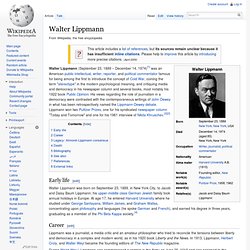
In 1913, Lippmann, Herbert Croly, and Walter Weyl became the founding editors of The New Republic magazine. During World War I, Lippmann was commissioned a captain in the Army on June 28, 1918 and was assigned to the intelligence section of the AEF headquarters in France. He was assigned to the staff of Colonel Edward M. Through his connection to Colonel House, he became an adviser to President Woodrow Wilson and assisted in the drafting of Wilson's Fourteen Points speech.
Walter Lippmann in 1914 It was Lippmann who first identified the tendency of journalists to generalize about other people based on fixed ideas. Though a journalist himself, he did not assume that news and truth are synonymous. Legacy: Almond–Lippmann consensus[edit] Gustave Le Bon. Gustave Le Bon (7 May 1841 – 13 December 1931) was a French social psychologist, sociologist, anthropologist, inventor, and amateur physicist.
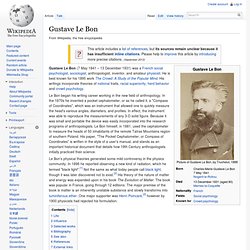
He is best known for his 1895 work The Crowd: A Study of the Popular Mind. His writings incorporate theories of national traits, racial superiority, herd behavior and crowd psychology. Le Bon began his writing career working in the new field of anthropology. In the 1870s he invented a pocket cephalometer, or as he called it, a "Compass of Coordinates", which was an instrument that allowed one to quickly measure the head's various angles, diameters, and profiles. In effect, the instrument was able to reproduce the measurements of any 3-D solid figure. Le Bon's physical theories generated some mild controversy in the physics community. Life[edit] Le Bon was born in Nogent-le-Rotrou, France (near Chartres), and died in Marnes-la-Coquette.
Graham Wallas. Graham Wallas[1] Graham Wallas portrait taken c.1920s.
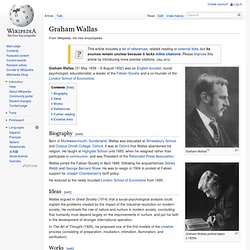
Graham Wallas (31 May 1858 – 9 August 1932) was an English socialist, social psychologist, educationalist, a leader of the Fabian Society and a co-founder of the London School of Economics. Biography[edit] Born in Monkwearmouth, Sunderland, Wallas was educated at Shrewsbury School and Corpus Christi College, Oxford. It was at Oxford that Wallas abandoned his religion. Wallas joined the Fabian Society in April 1886, following his acquaintances Sidney Webb and George Bernard Shaw.
He lectured at the newly founded London School of Economics from 1895. Ideas[edit] Wallas argued in Great Society (1914) that a social-psychological analysis could explain the problems created by the impact of the industrial revolution on modern society. Sigmund Freud. Sigmund Freud (/frɔɪd/;[2] German pronunciation: [ˈziːkmʊnt ˈfʁɔʏ̯t]; born Sigismund Schlomo Freud; 6 May 1856 – 23 September 1939) was an Austrian neurologist, now known as the father of psychoanalysis.
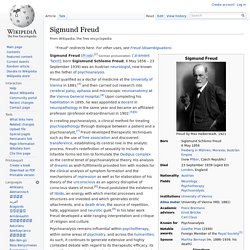
Freud qualified as a doctor of medicine at the University of Vienna in 1881,[3] and then carried out research into cerebral palsy, aphasia and microscopic neuroanatomy at the Vienna General Hospital.[4] Upon completing his habilitation in 1895, he was appointed a docent in neuropathology in the same year and became an affiliated professor (professor extraordinarius) in 1902.[5][6] Psychoanalysis remains influential within psychotherapy, within some areas of psychiatry, and across the humanities. As such, it continues to generate extensive and highly contested debate with regard to its therapeutic efficacy, its scientific status, and whether it advances or is detrimental to the feminist cause.[10] Nonetheless, Freud's work has suffused contemporary Western thought and popular culture.
Anna Freud. Anna Freud (3 December 1895 – 9 October 1982) was the sixth and last child of Sigmund Freud and Martha Bernays. Born in Vienna, she followed the path of her father and contributed to the newly born field of psychoanalysis. Alongside Melanie Klein, she may be considered the founder of psychoanalytic child psychology:[1] as her father put it, child analysis 'had received a powerful impetus through "the work of Frau Melanie Klein and of my daughter, Anna Freud"'.[2] Compared to her father, her work emphasized the importance of the ego and its ability to be trained socially. Biography[edit] The Vienna years[edit] Later on Anna Freud would say that she didn’t learn much in school; instead she learned from her father and his guests at home.
In 1914 she passed the test to be a trainee at her old school, the Cottage Lyceum. The London years[edit] In 1938 the Freuds had to flee from Austria as a consequence of the Nazis' intensifying harassment of Jews in Vienna following the Anschluss by Germany. George Creel. Ivy Lee. Un article de Wikipédia, l'encyclopédie libre.
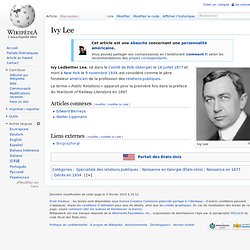
Ivy Lee Le terme « Public Relations » apparait pour la première fois dans la préface du Yearbook of Railway Literature en 1897. Articles connexes[modifier | modifier le code] Liens externes[modifier | modifier le code] Biographie Portail des États-Unis. Edward Bernays. Pour les articles homonymes, voir Bernays.
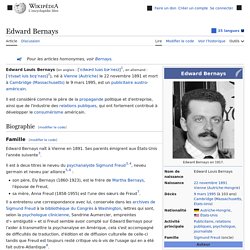
Bernays en 1917 Œuvres principales.